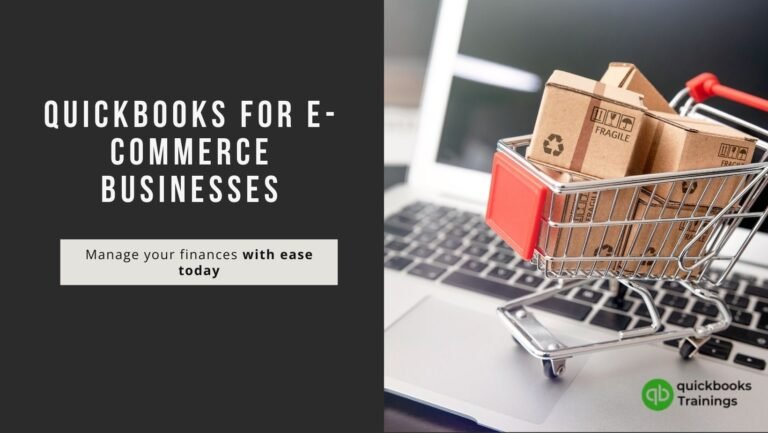What is QuickBooks, and how does it work?
What is QuickBooks
QuickBooks is a widely used accounting software developed by Intuit. It is designed to help businesses track income, manage expenses, and streamline financial operations. It provides solutions for bookkeeping, invoicing, tax preparation, payroll management, and financial reporting.
Small and medium-sized businesses and freelancers use QuickBooks to automate financial tasks, reducing the need for manual bookkeeping. As of 2019, over 3.3 million businesses subscribed to QuickBooks Online, with approximately 40% being small businesses.
How QuickBooks Works
QuickBooks functions as a economic control system that simplifies accounting by combining multiple features into one platform. It is available in different versions, including:
- QuickBooks Online – A cloud-based solution accessible from any device with an internet connection.
- QuickBooks Desktop – A locally installed version with advanced accounting tools for Windows and Mac.
- QuickBooks for Mac – A macOS-compatible version with elements tailored for Apple users.
Businesses can use QuickBooks to:
Record and categorize economic transactions automatically.
Generate invoices and accept payments online.
Manage payroll and tax calculations efficiently.
Reconcile bank accounts to ensure accurate monetary documents.
Run financial reports for insights into profitability and cash flow.
Combine with third-party apps like TurboTax, ProConnect, and business management tools.
Subscription Plans and Features
QuickBooks Online offers various subscription plans based on industry needs. Most plans contain multi-currency assets, making it easier for companies dealing with global clients and suppliers. Businesses can choose between a monthly or annual subscription. QuickBooks provides a 30-day free trial to test its features before dedicating to a plan.
Difference Between Quicken and QuickBooks
Many people resemble Quicken and QuickBooks, but they serve different goals:
If you need private finance tracking, Quicken is the right choice. However, for business analysis, payroll, and invoicing, QuickBooks is the better resolution.
QuickBooks Versions and Their Characteristics
QuickBooks is known in different versions, each designed for typical business needs.
1. QuickBooks for Mac
- Tailored for Mac users, featuring iCloud record sharing and MacOS-optimized design.
- Some integrations are specified compared to QuickBooks Online.
- Available for a one-time payment rather than a subscription model.
2. QuickBooks Desktop
- A Windows-compatible version with robust accounting devices.
- It comes in different editions, such as QuickBooks Pro, which is perfect for small businesses.
- QuickBooks Premier – Includes industry-specific segments.
- QuickBooks Enterprise – Designed for large companies with advanced reporting, inventory tracking, and multi-user access.
- Offers automated backups and improved security features for sensitive financial data.
3. QuickBooks Online
- A cloud-based explanation that offers real-time access from any device.
- Supports multi-user collaboration and automatic updates.
- Multi-currency support is included in the Essentials, Plus, and Advanced subscription plans, making it an ideal option for businesses that are performing internationally.
- Easy integration with third-party apps like payment processors, payroll techniques, and tax software.
QuickBooks Online vs. QuickBooks Desktop: Key Differences

The fundamental difference between QuickBooks Online and QuickBooks Desktop is how they are accessed and stored.
QuickBooks Online (Cloud-Based)
- Access Anywhere – You can log in from any device with an internet connection.
- Automatic Backups – Your data is stored securely on Intuit’s servers.
- Subscription-Based – Monthly or yearly payment model.
- Real-Time Collaboration – Multiple users can work simultaneously from various locations.
- No Installation Required – Runs on a web browser.
QuickBooks Desktop (Locally Installed)
- Installed on a Specific Device – Works only on the computer where it is installed.
- One-Time Purchase (or Annual Subscription) – Some versions need a one-time fee, while others need an annual charge.
- More Advanced Features – Offers powerful accounting tools, specifically in QuickBooks Enterprise.
- Limited Remote Access – Only available from the established device (unless hosted on a remote server).
- Manual Data Backup – You need to back up files manually or set up automated backups.
Which One Should You Choose?
- Choose QuickBooks Online if you need flexibility, remote access, and automatic backups.
- Choose QuickBooks Desktop if you require developed elements and prefer local data control.
Expert Tips from a QuickBooks ProAdvisor at EFK CompuBooks
These are great insights from a QuickBooks ProAdvisor at EFK CompuBooks! Here are some key takeaways:
Why QuickBooks Online Stands Out
- Paperless Office – Attach and store document images directly within your accounting records.
- Integrated Apps – Sync with third-party apps for seamless administrative management.
- Remote Collaboration – Your accountant or bookkeeper can access and update data in real-time.
- Automatic Updates – No need for manual installations or software upgrades.
- Data Security & Accessibility – No need to transfer data files; everyone works from the same system.
- Robust Audit Log – Tracks all changes with timestamps and user details.
- Backup Strategy Recommended – Even with cloud storage, having a separate backup solution is a smart move.
- International Support – Choose a home currency and comply with tax regulations in different regions.
Pro Tip:
Even with QuickBooks Online’s complete audit log, using backup software is a good idea to restore previous data if needed.
Invoicing Made Easy with QuickBooks
Invoicing can be time-consuming and easy to forget if not appropriately managed. QuickBooks simplifies this process by automating invoicing tasks.
- Set up recurring invoices to save time.
- Schedule invoices are to be sent within your preferred timeline.
- Enable automatic payment reminders for overdue invoices.
Accounting with QuickBooks
QuickBooks provides essential tools to handle your bookkeeping efficiently:
- Track cash flow – Manage both inflow and outflow activities.
- Generate financial statements – Get a clear view of your company’s financial health.
- Scan and store receipts – Keep track of tax-deductible expenses.
- Mileage tracking – Log business trips using the mobile app.
- Integrated tools – Benefit from features like inventory management and time tracking.
With QuickBooks, staying on top of your business finances has never been easier.
Streamlined Payments, Payroll & Multicurrency with QuickBooks

Payments
Managing payments is easier with QuickBooks’ flexible payment options:
- Accept credit & debit card payments online.
- Offer contactless payments via the mobile app and card readers.
- Support ACH & eCheck payments for convenience.
- Automatically record payments & fees in QuickBooks Online for effortless accounting.
Payroll
QuickBooks Payroll helps businesses efficiently handle employee salaries:
- Choose from different payroll plans (extra fee applies).
- Automate payroll taxes—calculated, filed, and paid for you.
- Manage HR & employee benefits to keep your team engaged.
Multicurrency Accounts
For businesses with global transactions, QuickBooks provides:
- Support for multiple currencies in Essentials, Plus, and Advanced plans.
- Profiles for customers & suppliers in different currencies.
- Real-time exchange rate tracking, though bank fees may apply.
With QuickBooks, you can simplify business finances—from payments to payroll and beyond.
Is QuickBooks Easy to Learn?
QuickBooks is designed to be user-friendly, but it may take some time to master, especially for those familiar with traditional bookkeeping.
- Intuitive Interface – Built to simplify accounting for businesses.
- Learning Curve – Some accountants may find it different from manual ledger bookkeeping.
- Extensive Resources – QuickBooks provides Q&As, tutorials, and a vast knowledge base to help users.
- QuickBooks Community – Over one million contributors are available to answer questions.
The QuickBooks Pricing
QuickBooks Online offers various pricing plans tailored to business needs:
Freelancers – ‘Self-Employed” plan includes tax deductions and basic reports.
Small Businesses – Four different pricing tiers with various tax and financial tools.
Trial & Discounts – Choose between a 30-day free trial or promotional pricing—but not both.
With the right plan, QuickBooks can be an essential tool for managing business finances efficiently.
Which QuickBooks Plan is Best for Your Small Business?
Simple Start – $25/month
- 1 user + 2 accounting firm users
- Track income & expenses
- Invoice & accept payments
- Maximize tax deductions
- Run general reports
- Capture & organize receipts.
- Track miles
- Manage cash flow
- Sales and sales tax tracking
- Send estimates
- Manage 1099 contractors
Essentials – $50/month
- Includes Simple Start features, plus:
- 3 users
- Manage and pay bills.
- Time tracking
Plus – $80/month
- Includes Essentials features, plus:
- 5 users
- Inventory tracking
- Project profitability tracking
Advanced – $180/month
- Includes Plus features, plus:
- 25 users + 3rd accounting firm user
- Business insights and analytics
- Invoice and expenses batching
- Customizable access by role
- Exclusive premium apps
- Dedicated account team & online training
- Automated workflows
- Company data restoration
QuickBooks Self-Employed Pricing Plan
Self-Employed – $15/month
- Separate business and personal expenses
- Optimize Schedule C deductions.
- Quarterly tax estimates
- Automatic mileage tracking
Self-Employed Tax Bundle – $25/month
- Self-Employed features, plus:
- Pay estimated quarterly taxes.
- Transfer info to TurboTax
- One state & one federal tax return filing
Self-Employed Live Tax Bundle – $35/month
- Tax Bundle features, plus:
- Real CPA assistance
- Unlimited year-round advice
- CPA final review
QuickBooks Payroll Plans
Payroll Core – $45 + $4/employee/month
- Full-service payroll
- Automated taxes and forms
- Auto Payroll
- Health benefits for your team
- 401(k) plans
- 1099 E-File & Pay
- Expert support
- Next-day direct deposit
Payroll Premium – $75 + $8/employee/month
- Core features, plus:
- Same-day direct deposit
- Workers’ comp administration
- HR support center
- Expert review
- Track time on the go
Payroll Elite – $125 + $10/employee/month
- Premium features, plus:
- Expert setup
- 24/7 expert support
- Track time & projects on the go
- Tax penalty protection
- Personal HR advisor
Is QuickBooks Free?
QuickBooks offers a 30-day free trial for new users, which allows you to analyze the software’s components without any obligation. However, after the trial expires, you’ll need to choose a subscription plan to continue using the software.
- Important note: The free trial does not include promotional pricing for new users, and you’ll need to provide credit card details to begin your trial. If you choose to continue using QuickBooks after the trial, you will be charged according to the plan you select.






